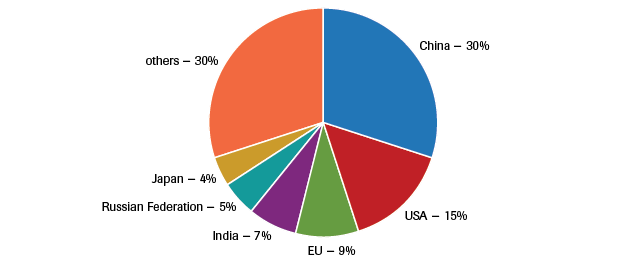The US withdrawal from the Paris climate agreement: German reactions

On 1 June, President Donald Trump announced that the US would withdraw from the Paris climate change agreement signed in 2015. The official reason for his decision was that he was keeping his promise during the elections to protect jobs in the US. In announcing the decision he stressed American unwillingness to participate in the Green Climate Fund, to which Washington was to have contributed the most of all the signatory states, i.e. US$3 billion by 2020 (Japan offered US$1.5 billion, the United Kingdom US$1.2 billion, France and Germany US$$1 billion each). Lobbying from American mining and fuel companies probably played a large role in the decision. Trump proposed the negotiation of a new international climate agreement, which was immediately rejected by the heads of state of Germany, France, Italy and China.
Commentary
- The US’s decision met with an unambiguously negative reaction in Germany. Its withdrawal from the agreement was criticised not only by politicians, the media and NGOs, but also by associations of German companies and heavy industry. Chancellor Angela Merkel issued a joint statement with the presidents of France and Italy which demonstrated the largest EU states’ unified position on climate policy. The Federal Association of German Industry (BDI) stated that Trump’s isolationist policy threatened the companies’ investment strategies and reduced their investment security. German industry, which supports the objectives of climate policy, fears becoming uncompetitive against American producers, who would not be covered by standards for reducing greenhouse gas emissions.
- The withdrawal of the US from this international agreement, in particular one which is a priority for Germany, additionally weakens the relationship between Berlin and Washington. Since Trump became president, tension in their bilateral relations has clearly increased. Trump has already declared a trade war with Germany, and he has reproved Berlin on several occasions for spending too little on defence within NATO. The withdrawal from the Paris agreement, in the negotiations of which Germany had been heavily involved, was received in Germany as the most serious break in relations with the US.
- At the same time, Trump’s decision strengthens the position of China in global climate diplomacy. Today China is the largest market for zero-emission technologies, and invests the most in them worldwide. The withdrawal of the US (15% of global emissions) leaves China (30%) as the most important negotiating partner for the EU (9%) and Germany (2.2%). Beijing will also gain politically, because as the largest producer it will be able to put pressure on other states to speed up or slow down the pace of emissions reduction. In addition, as the biggest market for green technologies, China will strengthen its position in these forward-looking industries, and will be an attractive location for European and American companies to invest in. Another important partner for Germany will be India, which today is responsible for 7% of global emissions, but which will outstrip the EU in this respect in the coming years. At the same time, India has promised to make major investments in renewable energy sources and electric mobility, thanks to which it could become an important market for German companies.
- Germany will be hoping that Trump’s decision need not have a negative impact on global emission reductions in the long term. The mere process of Washington’s withdrawal from the Paris agreement will take at least four years. By then, the US may have chosen another president who would represent the ecological ambitions of most of the American public and re-sign the climate agreement. Trump’s decision should not slow down the development of renewable energy sources in the US and around the world. Currently the US is the biggest market for renewable energy sources, after China. Around 350,000 people work in the solar power industry alone, and around 770,000 work in the RES as a whole; for comparison, the coal mines and coal-powered electricity plants employ around 160,000 people. Energy transformation in the US has been ongoing for at least 10 years, and is based on transferring energy production from coal to natural gas and renewable energy sources. No-one is expecting a return to investments in coal-fired energy on any significant scale.
Appendix
Global carbon dioxide emissions in 2015

Source: http://edgar.jrc.ec.europa.eu/overview.php?v=CO2ts1990-2015&sort=des9




